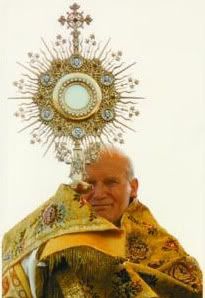Chesterton-inspired Thoughts
In a world without humour, the only thing to do is to eat. And how perfect an exception! How can these people strike dignified attitudes, and pretend that things matter, when the total ludicrousness of life is proved by the very method by which it is supported? A man strikes the lyre, and says, 'Life is real, life is earnest,' and then goes into a room and stuffs alien substances into a hole in his head.
Once again, Chesterton (from The Napoleon of Notting Hill) points out that the most commonplace things in life are really, when one gets right down to it, quite and thoroughly absurd, and more so in humans than in most animals. What sort of creature, in what sort of world, spends so much time and effort taking foreign objects and putting them in the hole that happens to be in its head? The gut response is "why, everything -- it's perfectly natural." But stop and think about that for a second -- it's natural because it's what we do, and we by default are accustomed to thinking of what we do and what we are accustomed to as necessary. We think that the universe could never have existed any other way. The Christian, though, should know this to be an absurdity -- God could have created the universe any way He saw fit; it could have different laws, it could look like anything. And if God did not create the universe, it surely would not have the absurdities that it does. It is the commonplace things in life, especially "normal" human activities, that best demonstrate God's existence and His truly cosmic wit. Take procreation, for instance -- I'm sorry, but there is simply no way that developed simply by accident. It is entirely too absurd. Not only is it an absurd act, but in humans it entails a far more absurd set of social norms and precursors (have you ever thought how fundamentally stupid kissing is on most levels?).
Obviously, I'm not saying these things are absurd in a bad way -- that we shouldn't do them. Rather, when one looks at them the way a being from another dimension or God would, without all of our preconceived human notions about what is necessary and normal and logical (most things we think of as being logical are no more dictated by logic than what color shirt I'm wearing), the world, and especially human life, is a great joke. And it's that joke, it's the Divine wit that underlies all the silly things we do, all the rediculous things that it is proper and fitting for us to do because we are human, that gives us a great insight, it seems, into the mind of God. That's why I view things like Chesterton's humor and the Humorous Mysteries as quite wholesome. We are accustomed to thinking about God's wrath and God's justice and God's mercy -- but what excuse do we have for forgetting God's mirth?
File Under: Catholic_Stuff








0 Comments:
Post a Comment
<< Home